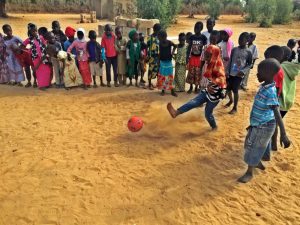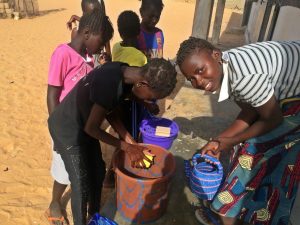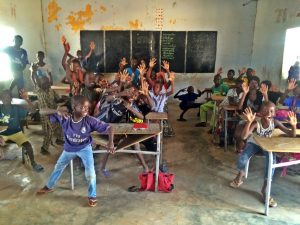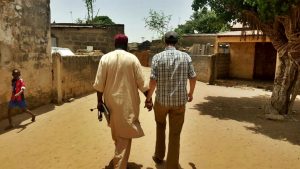This project is made possible through the partnership of WATER CHARITY and the NATIONAL PEACE CORPS ASSOCIATION. ![]()

Location
This project summary has been redacted for security reasons to omit the specific project location.
Fxxxx and Nxxxx, Fatick Region, Senegal
Community Description
Fxxxx and Nxxxx are in the Fatick Region of Senegal. These towns are located on the tidal salt waters of the Sine Saloum Delta and all inhabitants of the village are proud members of the Sereer minority ethnic group. The community gathers salt, fish, and shrimp for a living.
 During the rainy season, farmers also grow peanuts and millet. There are also a few beautiful mango and cashew orchards just to the north of the villages. The two towns work together to harvest salt on the shared salt flats, and often fish together. This has fostered strong bonds between the two villages, which is also strengthened through the numerous familial connections and shared farming land. In the rainy season, the salt flats separating the two villages flood, excluding a 3-kilometer raised dirt road that remains above the tide line.
During the rainy season, farmers also grow peanuts and millet. There are also a few beautiful mango and cashew orchards just to the north of the villages. The two towns work together to harvest salt on the shared salt flats, and often fish together. This has fostered strong bonds between the two villages, which is also strengthened through the numerous familial connections and shared farming land. In the rainy season, the salt flats separating the two villages flood, excluding a 3-kilometer raised dirt road that remains above the tide line.
The people are incredibly friendly, as part of the Senegalese tradition of Teranga (roughly translated to ‘hospitality’). A locally-run set of huts operates as a small hotel for tourists who want to get off the beaten path. The town is 11 kilometers from the nearest paved road and the dirt road varies in its state of upkeep.
Problem Addressed
A community-conducted baseline survey in Nxxxx identified several problems with activities related to proper sanitation and hygiene. The survey initially indicated that the number of households without latrines was just over 50%. However, further investigation indicates that 24 of 31 (77%) households do not have latrines.
Additionally, the neighboring town of Fxxxx has 26 households without latrines. Of these households in need, a total of 19 households—10 in Fxxxx and 9 in Nxxxx —have demonstrated the dedication and interest needed to participate in the project.
 Project Description
Project Description
This project is to build 19 latrines in the neighboring towns of Fxxxx and Nxxxx.
In both villages, counterparts will work together to construct latrines for households that lack basic sanitation facilities and engage in health classes to ensure proper usage, maintenance, and hand washing. This will increase the maximum benefit to the health of the community and the households directly affected.
The latrines will be single ventilated improved pit latrines. This was decided by the Fxxxx / Nxxxx Sanitation Committee as it met the standards of the existing latrines in the two villages.
The pits will be dug to 2-meters by 2-meters by 2-meters, and lined with concrete. Each latrine will have a PVC pipe vent and a Turkish-style seat made of concrete.
Families will additionally provide a wall or fencing to provide privacy during use. Adjacent to all latrines a hand washing station will be set up with soap to ensure proper hygiene.
All participating members will also attend three health classes related to proper handwashing, microbial disease transmission, and latrine maintenance. Additionally, part of the community contribution will go towards the purchasing of locally available handwashing stations.
The start of construction will be largely contingent on the water table and harvest. The water table must recede once the rains have stopped to begin digging the latrines. Also, the available labor for both community contribution and the mason will be devoted to the harvest of the peanuts before construction can begin. The mason has the capacity to delegate younger masons under his employ to engage in multiple projects simultaneously, so actual construction should move along quickly.
 The community role leading up to this will be crucial. Each household will make monetary and labor donations to their respective latrines, ensuring project ownership. Specifically, these families will provide money to pay for the cost of the manufacture of the cement plate and the handwashing station. The households will also dig the pits prior to the mason’s arrival and bring sand and water for cement mixing.
The community role leading up to this will be crucial. Each household will make monetary and labor donations to their respective latrines, ensuring project ownership. Specifically, these families will provide money to pay for the cost of the manufacture of the cement plate and the handwashing station. The households will also dig the pits prior to the mason’s arrival and bring sand and water for cement mixing.
The funds from Water Charity will go toward other materials and labor necessary for the project. These include cement, rebar, gravel, PVC piping, wire, masonry labor, and transport costs.
Project Impact
127 people will benefit from the project.
Peace Corps Volunteer Directing Project
H. Knecht
Monitoring and Maintenance
The latrines are designed to last for many years, providing long-lasting health benefits to the individual households receiving assistance and the community at large.
Education provided through the health classes will also introduce proper behavior to reduce diarrheal diseases, engage in proper waste management, and improve hygiene.
The construction of the latrines will be contingent on the presence of the households in these classes. Additionally, the Sanitation Committee will maintain an active presence in the community.
Project Funding
Funds for this project have been provided by an anonymous donor.